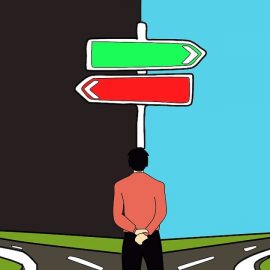

This article is an excerpt from the Shortform book guide to "I Thought It Was Just Me (but it isn't)" by Brené Brown. Shortform has the world's best summaries and analyses of books you should be reading.
Like this article? Sign up for a free trial here.
What are the best quotes from I Thought It Was Just Me (but it isn’t)? What do these quotes tell us about shame’s influence on us?
In I Thought It Was Just Me, Brené Brown discusses one of the most taboo topics of our culture: shame. She explains that shame is similar to embarrassment and triggers feelings of fear, blame, and disconnection.
Check out these I Thought It Was Just Me quotes to get a better understanding of Brown’s take on shame.
Quotes From I Thought It Was Just Me
We’ve all experienced situations that produce intense feelings of fear, blame, and disconnection and cause us to lash out at ourselves or others. Author and researcher Brené Brown explains that this intense feeling is called shame, and it’s a natural part of being human. However, allowing shame to control our thoughts, feelings, and behaviors wreaks major havoc on our health, happiness, and relationships. In I Thought It Was Just Me (but it isn’t), Brené Brown contends that to live a happy, empowered life—and help others to do the same—you must combat shame by practicing empathy toward yourself and others.
To get a brief idea of how Brown suggests we take down shame, we’re going to look at three of the best I Thought It Was Just Me quotes.
“Shame corrodes the very part of us that believes we are capable of change.”
Shame leads to anger and blame. This is because experiencing anger and assigning blame allows us to expel the negative emotion of shame. Anger replaces the painful feeling of shame, and assigning blame allows us to direct that anger either inward or outward. Brown argues that blame in any form is unproductive because it expels negative feelings that make us believe we can’t change as people.
When we direct our anger inward, we blame ourselves for being defective in some way and ultimately deserving the shameful experience. For example, if someone makes you feel unattractive, you might escape the feeling of shame by directing your anger inward and blaming yourself for being foolish enough to ever believe that you were attractive. Blaming yourself overrides the feeling of shame by inducing self-hatred and self-pity instead.
“If you want to make a difference, the next time you see someone being cruel to another human being, take it personally. Take it personally because it is personal!”
To constructively talk about shame, explain the identity that’s causing your fear, how it makes you feel, why it makes you feel that way, and what kind of support you need instead.
For example, if you ask a question in school and a classmate makes you feel stupid by implying that your questions are dumb, you can explain to them:
“When I ask questions and you say things like ‘wasn’t that obvious?’, you really hurt me and make me feel stupid. I ask questions because I want to ensure that I fully understand topics, but when you make negative remarks like that, it discourages me from wanting to learn and creates a hostile environment. Instead, I’d prefer if you either offered to answer my questions or remained quiet so the professor can answer them.”
“Compassion is not a virtue—it is a commitment. It’s not something we have or don’t have—it’s something we choose to practice.”
Brown defines compassion as the ability and willingness to empathize without judgment and face pain. Compassion means looking at your own actions with understanding rather than anger and doing the same for others. It requires you to reflect on your pain and empathize with others by sharing the pain that they feel.
Compassion is crucial to overcoming shame because it combats blame. First, practicing compassion helps us avoid self-blame because we can acknowledge that our shame (and thus, our blame) is caused by our fears, not by the fact that we’re defective in some way.
Second, compassion prevents us from blaming others because it can help us see that other people are struggling with shame and fear, too. If the other person intentionally shamed us, it’s probably because they’re also experiencing the fear of certain identities. Blaming them won’t help them to overcome this, and it won’t heal our shame, either.
For example, if someone shames you for being nerdy, having compassion will help you avoid self-blame by helping you acknowledge that there’s nothing wrong with your interests: Rather, you’re experiencing shame because of unjust societal standards. You’ll also see that while the other person’s actions might not be right, they’re probably struggling with fear about being seen as “nerdy” as well.

———End of Preview———
Like what you just read? Read the rest of the world's best book summary and analysis of Brené Brown's "I Thought It Was Just Me (but it isn't)" at Shortform.
Here's what you'll find in our full I Thought It Was Just Me (but it isn't) summary:
- Brené Brown's guide on what shame is, why it happens, how it impacts our lives
- How to build empathy and combat shame
- Why it's important to talk about shame with others






